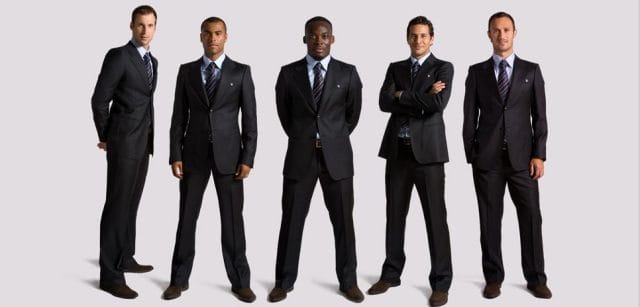
There may be more to life, in the words of Derek Zoolander, than being really, really ridiculously good looking. But it never hurts to look good in a suit.
As Priceonomics has covered previously, attractive people don’t just enjoy an advantage in the dating world, they have a leg up in life. Thanks to the halo effect that good looks engender, people attribute positive traits — from honesty and kindness to intelligence and loyalty — to people for no more reason than their winning smiles and nice abs.
Social scientists have mapped out innumerable ways that this halo effect benefits attractive people. One Harvard researcher calculated that attractive people earn, on average, 10-15% more than workers of below average beauty. For the same reason that attractive salespeople do a better job selling everything from beer to enterprise software, hiring an attractive CEO leads to a bump in a company’s stock price — at least in the short run. Thanks to all the advantages afforded to them, attractive people seem to occupy more than their fair share of leadership positions.
According to Stanford researchers, they may feel entitled to.
In 2008, doctoral student Peter Belmi was struck by how Americans’ spending on beauty and grooming products continued to grow despite the recession. This interest eventually led to his forthcoming article with management professor Margaret Neale, “Mirror, Mirror on the Wall, Who’s the Fairest of Them All: Thinking that One is Attractive Increases the Tendency to Support Inequality.”
The two researchers attempted to investigate the effect of good looks on feelings about inequality by prompting study participants to write about times when they felt more or less attractive. With this nudge, the researchers then measured their attitudes about inequality.
As a Stanford GSB article relates, the biggest surprise for Belmi was the discovery that “most people seem to endorse hierarchy when they think they’re attractive and oppose it when they think they’re not.” Subjects prompted to perceive themselves as attractive were more likely to agree with statements such as “Lower wages for women and ethnic minorities reflect lower skill and education level” and less likely to support and give money to a cause like the Occupy movement. In contrast, those prompted to remember times when they felt unattractive were more likely to see hierarchies as reflecting circumstances other than hard work and ability — and to support shaking up the established order.
Additionally, Belmi and Neale found that prompting people to view themselves as more attractive resulted in the subjects believing that they should be part of a higher social class. The same GSB article quotes the two researchers: many people “see the social world as fundamentally stratified not only on the basis of who has wealth, education, and occupational prestige, but also on the basis of who is beautiful and attractive.”
Like many social science experiments, the effort to isolate attractiveness as a variable makes the experiment seem fragile. Will the impact of a memory hold true outside controlled, experimental conditions? Is the measured effect significant compared to all the other competing factors that influence our views?
Still, the Stanford researchers’ work suggests that attractive people more readily endorse hierarchies, perhaps reflecting a long established link between beauty and power dating back to ideas of nobility, if not evolutionary origins.
When people learn about the halo effect that attractive people enjoy, the strength of the effect almost always surprises them — although never its existence. But given Belmi and Neale’s conclusion, maybe people aren’t as clueless as they let on. It makes a lot of sense to endorse hierarchies as fair when you already have a leg up.
This post was written by Alex Mayyasi. Follow him on Twitter here or Google Plus. To get occasional notifications when we write blog posts, sign up for our email list.



